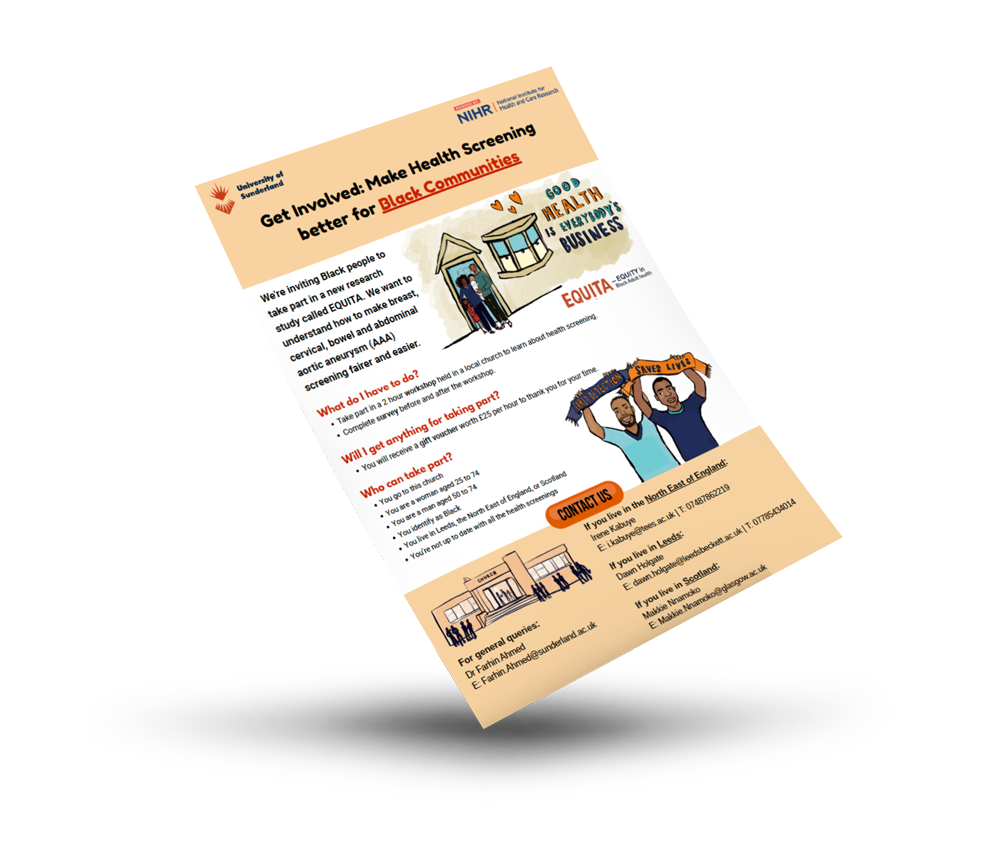The EQUITA study:
EQUITy in Black Adult health
The EQUITA study is funded by the National Institute for Health and Care Research (NIHR) and underpinned by both IMCAN and PROCAN-B studies.
EQUITA focuses on improving awareness and uptake of important NHS health screening programmes – for breast, cervical, bowel and abdominal aortic aneurysm (AAA) screening – for Black African and Caribbean communities across the UK. These screening tests help find serious health problems early, often before symptoms appear, which can save lives.
We know that Black African and Caribbean communities in the UK are less likely to use these screenings. This means Black people are more likely to find out about illnesses too late for them to be best treated and cured. That’s why this study is being conducted together with Black communities, to make screening information more relatable, accessible and respectful of culture.
There are opportunities to take part in this research, you can find the information below.
Study duration: March 2025–February 2027
Our plan to design and deliver this study
In the photo: Prof Judith Eberhardt, Dr Floor Christie de-Jong and Mrs Irene Kabuye.
Photo: David James Wood PhotographerWe have done similar research before which underpins the EQUITA study
We worked together with Muslim women to create a workshop promoting breast, bowel and cervical cancer screening. Women enjoyed taking part and told us they learned about screening. They also felt more positive about screening.
Read about IMCAN
We also created an effective workshop together with Black African and Caribbean men to promote early diagnosis of prostate cancer. We had overwhelming positive feedback and are looking to scale up this work.
Read about PROCAN-B
There are many reasons why Black people find it difficult to take part in breast, cervical, bowel and AAA screening tests:
they may not always know about screening
they may feel embarrassed
they have had bad experiences with healthcare before
Our 24-month study will try out our co-designed workshop with the community to inform and encourage more Black people to have these life-saving tests.
First, we need to explore how the workshop might be adapted, whether we can train others to deliver it, whether Black communities are interested in attending, and whether they find it helpful and positive.
We will try out the workshop with 300 Black people who have not gone for all their screenings (women aged 25-74, men aged 50 and over).
We will run the workshop in churches in Scotland, the North East of England and Leeds.
People will be split into two groups: one that attends the workshop and another that does not (they will be able to attend the workshop later!).
We will ask people to complete surveys before and after the workshop to see if their knowledge of, and attitudes towards, screening have changed.
We will ask for feedback from people who take part in the workshops by talking to them in group discussions or interviews to help make the workshop better.
We will also ask what they thought of taking part in the EQUITA study.

What we expect to find out
This study will check if our workshop works well and if any changes are necessary. We want to see if people come to the workshop and if it helps them learn about screening, if it changes their views on it and gets more people to go for screenings. This will tell us if we should make any improvements to the workshop. We will share what we learn with the community and with health workers. If our results are good, we will try to get more funding to do the larger trial to test the workshop.
Get involved in the study
To know more, read this
information leaflet.
Get in touch at EQUITA@sunderland.ac.uk
EQUITA team
Chief Investigator
Associate Professor in Public Health for Medicine, School of Medicine, University of Sunderland
Lecturer in Health Psychology/Behavioural Sciences related to Dentistry, Dental School, University of Glasgow
Community Recruitment Lead, Teesside University
Research Fellow Health Economics and Health Technology Assessment, University of Glasgow
Joint Lead
Professor of Psychology and Public Health Equity, Teesside University
Director of Biostatistics / Professor of Clinical Trial Biostatistics, Robertson Centre for Biostatistics, University of Glasgow
Ms Chiamaka Nnamoko
Community Recruitment Lead, University of Glasgow
Senior Lecturer in Research methods, Teesside University
Dr Farhin Ahmed
Research Associate, School of Medicine, University of Sunderland
Director of Public Health, Public Health South Tees
Professor of Health Psychology, Leeds Beckett University
Professor of Behavioural Science and Health, School of Health and Wellbeing, University of Glasgow
Consultant in Public Health, North Tees and Hartlepool NHS Foundation Trust
Associate Professor in Public Health, Northumbria University
GP University Lecturer, School of Health and Wellbeing, University of Glasgow
Ms Dawn Holgate
Community Recruitment Lead, Leeds Beckett University
Junior Biostatistician, University of Glasgow





